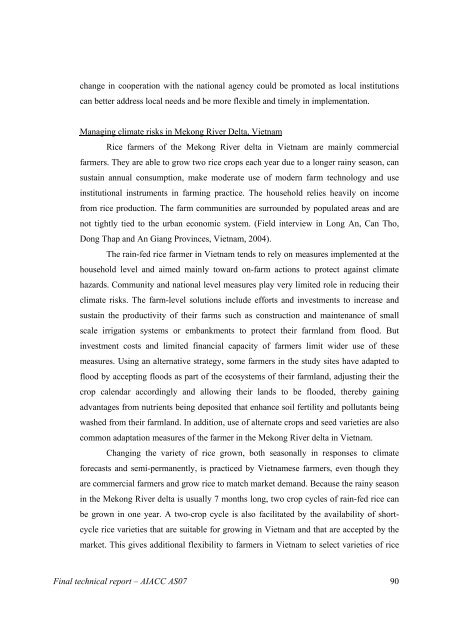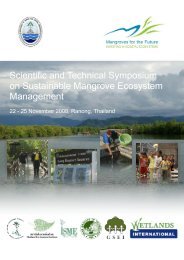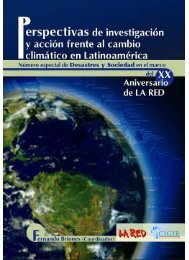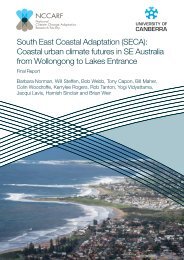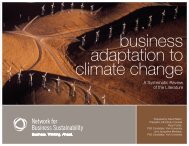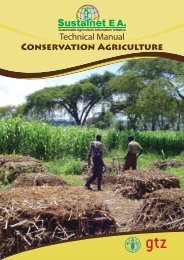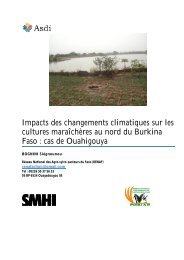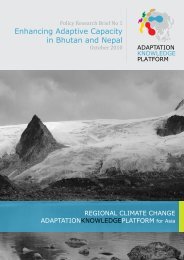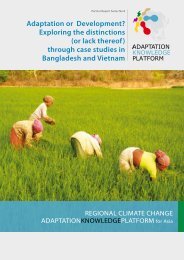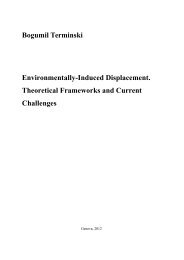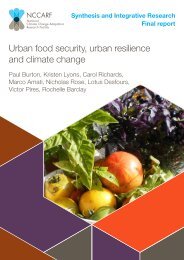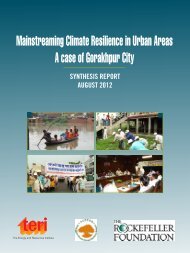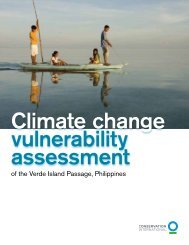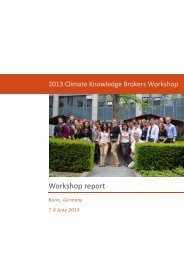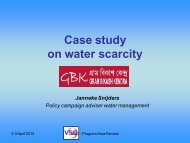Final Technical Report - weADAPT
Final Technical Report - weADAPT
Final Technical Report - weADAPT
- No tags were found...
You also want an ePaper? Increase the reach of your titles
YUMPU automatically turns print PDFs into web optimized ePapers that Google loves.
change in cooperation with the national agency could be promoted as local institutions<br />
can better address local needs and be more flexible and timely in implementation.<br />
Managing climate risks in Mekong River Delta, Vietnam<br />
Rice farmers of the Mekong River delta in Vietnam are mainly commercial<br />
farmers. They are able to grow two rice crops each year due to a longer rainy season, can<br />
sustain annual consumption, make moderate use of modern farm technology and use<br />
institutional instruments in farming practice. The household relies heavily on income<br />
from rice production. The farm communities are surrounded by populated areas and are<br />
not tightly tied to the urban economic system. (Field interview in Long An, Can Tho,<br />
Dong Thap and An Giang Provinces, Vietnam, 2004).<br />
The rain-fed rice farmer in Vietnam tends to rely on measures implemented at the<br />
household level and aimed mainly toward on-farm actions to protect against climate<br />
hazards. Community and national level measures play very limited role in reducing their<br />
climate risks. The farm-level solutions include efforts and investments to increase and<br />
sustain the productivity of their farms such as construction and maintenance of small<br />
scale irrigation systems or embankments to protect their farmland from flood. But<br />
investment costs and limited financial capacity of farmers limit wider use of these<br />
measures. Using an alternative strategy, some farmers in the study sites have adapted to<br />
flood by accepting floods as part of the ecosystems of their farmland, adjusting their the<br />
crop calendar accordingly and allowing their lands to be flooded, thereby gaining<br />
advantages from nutrients being deposited that enhance soil fertility and pollutants being<br />
washed from their farmland. In addition, use of alternate crops and seed varieties are also<br />
common adaptation measures of the farmer in the Mekong River delta in Vietnam.<br />
Changing the variety of rice grown, both seasonally in responses to climate<br />
forecasts and semi-permanently, is practiced by Vietnamese farmers, even though they<br />
are commercial farmers and grow rice to match market demand. Because the rainy season<br />
in the Mekong River delta is usually 7 months long, two crop cycles of rain-fed rice can<br />
be grown in one year. A two-crop cycle is also facilitated by the availability of shortcycle<br />
rice varieties that are suitable for growing in Vietnam and that are accepted by the<br />
market. This gives additional flexibility to farmers in Vietnam to select varieties of rice<br />
<strong>Final</strong> technical report – AIACC AS07 90


